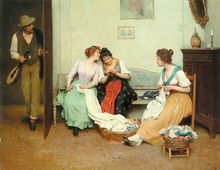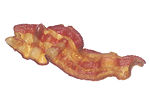- Chew the fat
-
"Chew the fat" or "chew the rag"[1] are English expressions for gossiping or making friendly small talk; the former being mainly in American vernacular and the latter being in British.[2]
Contents
Origin
Chew the fat
Although some sources attribute the phrase "chew the fat" to sailors, who during a period of resting and conversing, or while working together,[2] would chew on salt-hardened fat,[3] there are no reliable historical recordings of this practice. It has even been suggested that the phrase is derived from a practice by North American Indians or Inuit of chewing animal hides during their spare time, and even of British farmers chewing on smoked pork,[4] but again, there remains to be no evidence supporting these claims, and would requires accepting a great deal of uncertainty in connecting the phrase from nautical origins to its modern metaphorical use.[2]
There are also claims that the phrase is synonymous with the action of chewing fat, or simply an allusion to the movement of the mouth during chewing.[5] Noting that fried fat is appealing in taste, it was regarded as a treat that someone could chew on for as long as possible to gain the most out of it.[6]
According to the Oxford English Dictionary, "Chew the fat" first appeared in 1885 in a book by J Brunlees Patterson called Life in the Ranks of the British Army in India. He implied it was a kind of general grumbling and bending of the ears of junior officers to stave off boredom, a typical part of army life.[7] Patterson also uses "chew the rag" in the same sentence he used "chew the fat", but it is not the oldest occurrence.[7]
Chew the rag
Appearing first in print from 1875 in "Random House Historical Dictionary of American Slang", the excerpt reads:
"Gents, I could chew the rag hours on end, just spilling out the words and never know no more than a billy-goat what I’d been saying."[7]It is speculated that this phrase is related to cloth, when ladies would work in "sewing circles",[8] or that women may have gossiped while quilting.[2]
The first appeared synonymously as early as 1885,[5] in J. Brunlees Patterson's "Life in the ranks of the British army in India and on board a troopship", which listed the terms in succession:
"..whistling, singing, arguing the point, chewing the rag, or fat, or other voluble and noisy inflictions, such as the screeching and gabbling of parrots and yelping of canines.."[9]It was used as a way to describe complaining or grumbling,[5] typically by the military.
Modern usage
It was not until 1907 that the phrase "chew the fat" was used to express partaking in idle conversation,[5] for a friendly talk, or a gossip session.[8] It has also been used to a way to define telling tall tales.[10]
In ham radio, extended conversation, as opposed to just exchanging basic information (name, location, equipment), is called "ragchewing".[11][12]
Chewin' the Fat was the title of a Scottish comedy sketch show, starring Ford Kiernan, Greg Hemphill and Karen Dunbar. Chewin' the Fat first started as a radio series on BBC Radio Scotland.
Chew-The-Fat.com is a UK-based website hosting a web forum, described as "The chat forum your mother warned you about", devoted to chat, gossip, and humorous banter and cartoons.[13]
Email hoax
In 1999, a widespread hoax called "Life in the 1500s", false information was circulated through email regarding "chew the fat".[14] Among offering explanations for many phrases, the email stated:
"When company came over, they would bring out some bacon and hang it to show it off. It was a sign of wealth and that a man "could really bring home the bacon." They would cut off a little to share with guests and would all sit around and "chew the fat.""[15]This caused reexamination of many folk phrases and idioms, which had falsified many phrase etymologies.[10][14][16] Although it has been widely accepted as accurate,[7] this misinformation has since been dispelled.
References
- ^ Stuart-Hamilton, Ian (Jessica Kingsley Publishers , 2007). "chew the fat." An Asperger dictionary of everyday expressions. Retrieved 2010-08-09
- ^ a b c d Palmatier, Robert Allen (2010-08-11). "chew the fat." Food: a dictionary of literal and nonliteral terms. Retrieved 2010-08-11
- ^ Breverton, Terry (2004, Pelican Publishing Company) "Chew the fat." The pirate dictionary. Retrieved 2010-08-11
- ^ Quinion, Michael (2004, Smithsonian Books in association with Penguin Books) "p. 75." Ballyhoo, buckaroo, and spuds: ingenious tales of words and their origins. Retrieved 2010-08-11
- ^ a b c d Kipfer, Barbara Ann (2008, Sourcebooks). "Chew the fat." Phraseology. Retrieved 2010-08-09
- ^ De Mente, Boye Lafeyette (2007, Tuttle Publishing). "Chew the fat." Cheater's Guide to Speaking English Like a Native . Retrieved 2010-08-10
- ^ a b c d Quinion, Michael (2007-11-03). "Chew the fat." World Wide Words. Retrieved 2010-08-11
- ^ a b Ammer, Christine (1997, Houghton Mifflin Harcourt). "chew the fat." The American Heritage dictionary of idioms. Retrieved 2010-08-11
- ^ Patterson, J. Brunless (1885). "...spirits and others who indulge in the various diversions of whistling, singing.." Life in the ranks of the British army in India and on board a troopship. Retrieved 2010-08-11
- ^ a b Wilton, David (2004, Oxford University Press). "Chew the fat." Word myths: debunking linguistic urban legends. Retrieved 2010-08-11
- ^ Urban Dictionary
- ^ Rag Chewers Club
- ^ Chew-The-Fat.com
- ^ a b Mikkelson, Barbara (2007-07-12). "Life in the 1500s." Snopes.com Retrieved 2010-08-11
- ^ "Life in the 1500s." Virtual Teachers. Retrieved 2010-08-11
- ^ Lederer, Richard (2003, MacMillan). "Spook etymology on the Internet." A man of my words: reflections on the English language. Section regarding this article available here Retrieved 2010-08-11
Categories:- Human communication
- English phrases
- Internet hoaxes
- 1999 hoaxes
Wikimedia Foundation. 2010.


